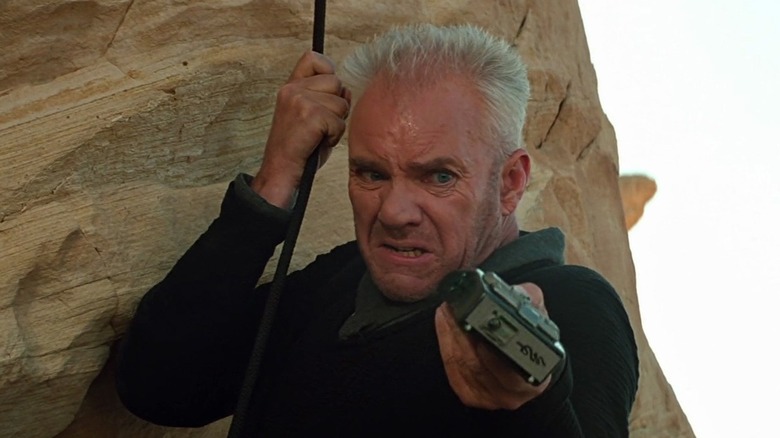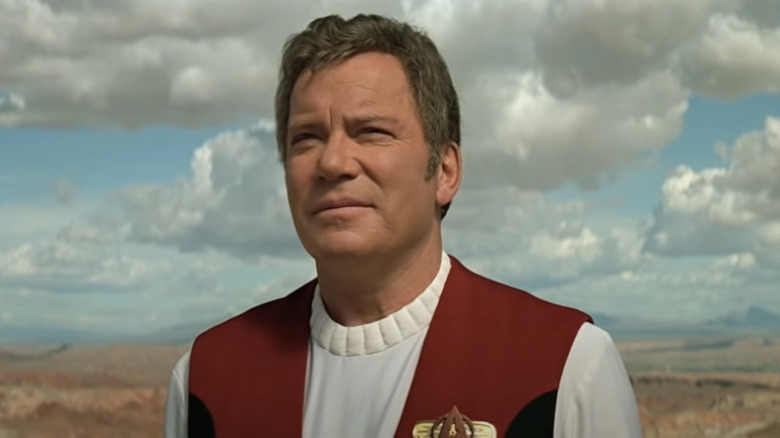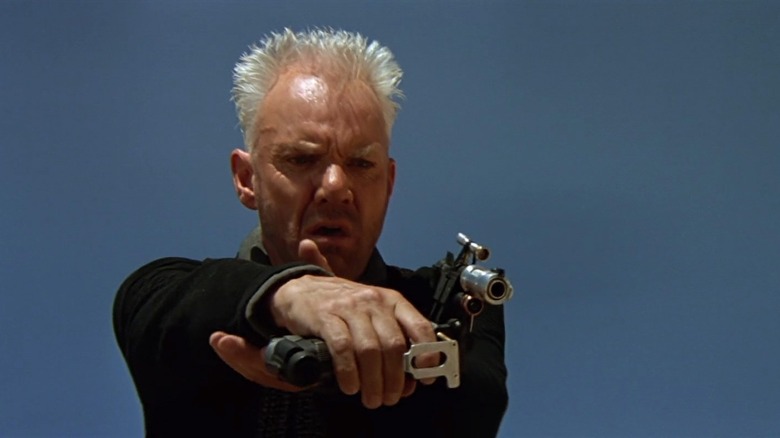Captain Kirk's Star Trek Death Led To Some Very Real Threats For Malcolm McDowell
There are a lot of intense fandoms out there, but few have been as intense for as long as the "Star Trek" fandom, which has been going strong since 1966. There are few things more sacred to Trekkies (or Trekkers, depending on who you ask) than their starship captains, and in 1994, the franchise committed a serious sin by killing off the beloved James Tiberius Kirk, played by William Shatner, in the film "Star Trek: Generations." It was supposed to be a kind of passing of the baton from Kirk to Captain Jean-Luc Picard, played by Patrick Stewart, but in the end all it did was upset fans. Of course, they knew that the seemingly immortal Kirk would eventually die, but they didn't really want or need to see it, and that led to a whole lot of anger directed at the man responsible for Kirk's death: Dr. Tolian Soran, played by Malcolm McDowell.
When Dr. Toran tries to alter the path of an energy ribbon in space that will cause the destruction of a nearby inhabited planet in "Generations," it's up to Kirk and Picard to stop him. Kirk is fatally injured and Picard buries him at the site, which really bothered many fans. It bothered them so much, in fact, that they made their ire known to McDowell, even going as far as to send him death threats! The veteran actor of stage and screen wasn't too worried about the threats (after the controversy over "A Clockwork Orange," he was probably pretty used to it), but apparently others took it much more seriously, which led to a bit of embarrassment for McDowell.
A final farewell leads to furious fans
In an interview with Mental Floss back in 2010, McDowell revealed that he had received death threats after "Star Trek: Generations," and explained how he and Paramount Pictures didn't exactly see eye-to-eye on the whole thing:
"I didn't take it seriously. The studio took it seriously. I suppose they had to because they didn't want a lawsuit. They assigned two detectives to come with me to New York to do the press. It was a complete waste of time and quite funny. I kept telling the guys to go home, and they were going to stay outside my room the whole night at the Carlyle Hotel. I went for a walk, and they came with me. I literally came out of the Carlyle at 10 o'clock at night. I looked this way and that way, and there wasn't one person on the street. Not one. I went, 'Wow, this is some death threat.' I said, 'I feel embarrassed that nobody's tried to kill me, for Christ's sake! I feel like I'm letting the detectives down.'"
It's pretty funny that McDowell felt like he was letting the detectives down and that there wasn't really any real threat, but it's also a good thing that the threats amounted to nothing. After all, McDowell doesn't deserve to be hated for the actions of his character, and his involvement in Kirk's death had almost been much, much worse.
Dr. Soran originally shot Kirk in the back
That's right, in the original ending of "Star Trek: Generations," Dr. Toran wasn't just indirectly responsible for the death of Kirk, but he shot him in the back and killed him. Then Picard shot and killed Toran in retaliation, which really just doesn't vibe with Picard's sensibilities. The version we got has Kirk falling a long ways and being grievously injured, with enough time for Picard to hold him in his final moments and have a short bit of dialogue. "Generations" is a messy movie that's not exactly beloved by the majority of "Trek" fans, but Kirk's final moments and realization of death are truly poignant. Thank goodness the original ending was scrapped, giving Kirk the send-off he deserved.
Major character deaths have become a part of the "Star Trek" franchise over the years, though thankfully they're few and far between. After all, the crews on each "Star Trek" show start to feel like family, and too many of those kinds of losses would make the franchise unwatchable. Kirk's legacy lives on, both in our world and that of the franchise, and the fans seem to have forgiven Malcolm McDowell for playing his part in the beloved character's end.


